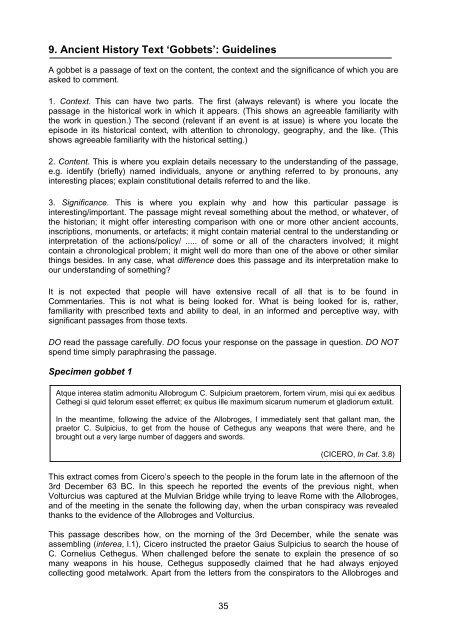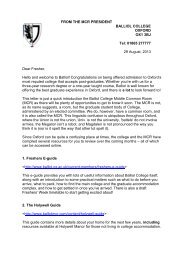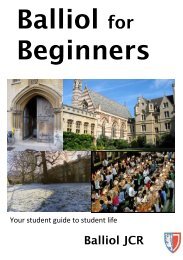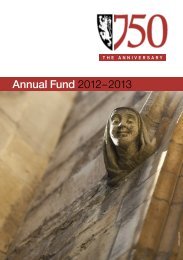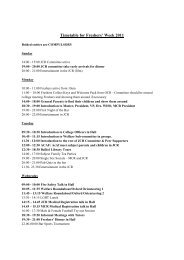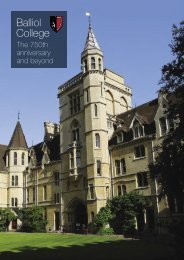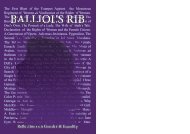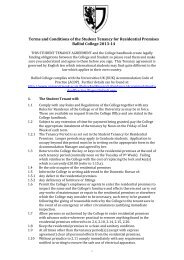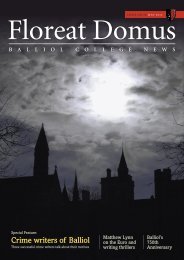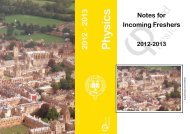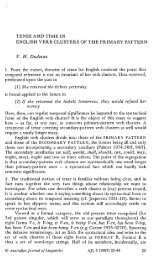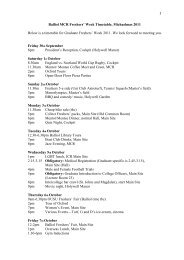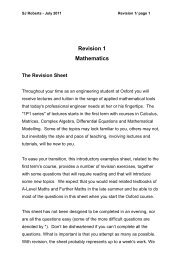CAAH Mods 2011 - Balliol College - University of Oxford
CAAH Mods 2011 - Balliol College - University of Oxford
CAAH Mods 2011 - Balliol College - University of Oxford
You also want an ePaper? Increase the reach of your titles
YUMPU automatically turns print PDFs into web optimized ePapers that Google loves.
9. Ancient History Text ‘Gobbets’: Guidelines<br />
A gobbet is a passage <strong>of</strong> text on the content, the context and the significance <strong>of</strong> which you are<br />
asked to comment.<br />
1. Context. This can have two parts. The first (always relevant) is where you locate the<br />
passage in the historical work in which it appears. (This shows an agreeable familiarity with<br />
the work in question.) The second (relevant if an event is at issue) is where you locate the<br />
episode in its historical context, with attention to chronology, geography, and the like. (This<br />
shows agreeable familiarity with the historical setting.)<br />
2. Content. This is where you explain details necessary to the understanding <strong>of</strong> the passage,<br />
e.g. identify (briefly) named individuals, anyone or anything referred to by pronouns, any<br />
interesting places; explain constitutional details referred to and the like.<br />
3. Significance. This is where you explain why and how this particular passage is<br />
interesting/important. The passage might reveal something about the method, or whatever, <strong>of</strong><br />
the historian; it might <strong>of</strong>fer interesting comparison with one or more other ancient accounts,<br />
inscriptions, monuments, or artefacts; it might contain material central to the understanding or<br />
interpretation <strong>of</strong> the actions/policy/ ..... <strong>of</strong> some or all <strong>of</strong> the characters involved; it might<br />
contain a chronological problem; it might well do more than one <strong>of</strong> the above or other similar<br />
things besides. In any case, what difference does this passage and its interpretation make to<br />
our understanding <strong>of</strong> something<br />
It is not expected that people will have extensive recall <strong>of</strong> all that is to be found in<br />
Commentaries. This is not what is being looked for. What is being looked for is, rather,<br />
familiarity with prescribed texts and ability to deal, in an informed and perceptive way, with<br />
significant passages from those texts.<br />
DO read the passage carefully. DO focus your response on the passage in question. DO NOT<br />
spend time simply paraphrasing the passage.<br />
Specimen gobbet 1<br />
Atque interea statim admonitu Allobrogum C. Sulpicium praetorem, fortem virum, misi qui ex aedibus<br />
Cethegi si quid telorum esset efferret; ex quibus ille maximum sicarum numerum et gladiorum extulit.<br />
In the meantime, following the advice <strong>of</strong> the Allobroges, I immediately sent that gallant man, the<br />
praetor C. Sulpicius, to get from the house <strong>of</strong> Cethegus any weapons that were there, and he<br />
brought out a very large number <strong>of</strong> daggers and swords.<br />
(CICERO, In Cat. 3.8)<br />
This extract comes from Cicero’s speech to the people in the forum late in the afternoon <strong>of</strong> the<br />
3rd December 63 BC. In this speech he reported the events <strong>of</strong> the previous night, when<br />
Volturcius was captured at the Mulvian Bridge while trying to leave Rome with the Allobroges,<br />
and <strong>of</strong> the meeting in the senate the following day, when the urban conspiracy was revealed<br />
thanks to the evidence <strong>of</strong> the Allobroges and Volturcius.<br />
This passage describes how, on the morning <strong>of</strong> the 3rd December, while the senate was<br />
assembling (interea, l.1), Cicero instructed the praetor Gaius Sulpicius to search the house <strong>of</strong><br />
C. Cornelius Cethegus. When challenged before the senate to explain the presence <strong>of</strong> so<br />
many weapons in his house, Cethegus supposedly claimed that he had always enjoyed<br />
collecting good metalwork. Apart from the letters from the conspirators to the Allobroges and<br />
35


